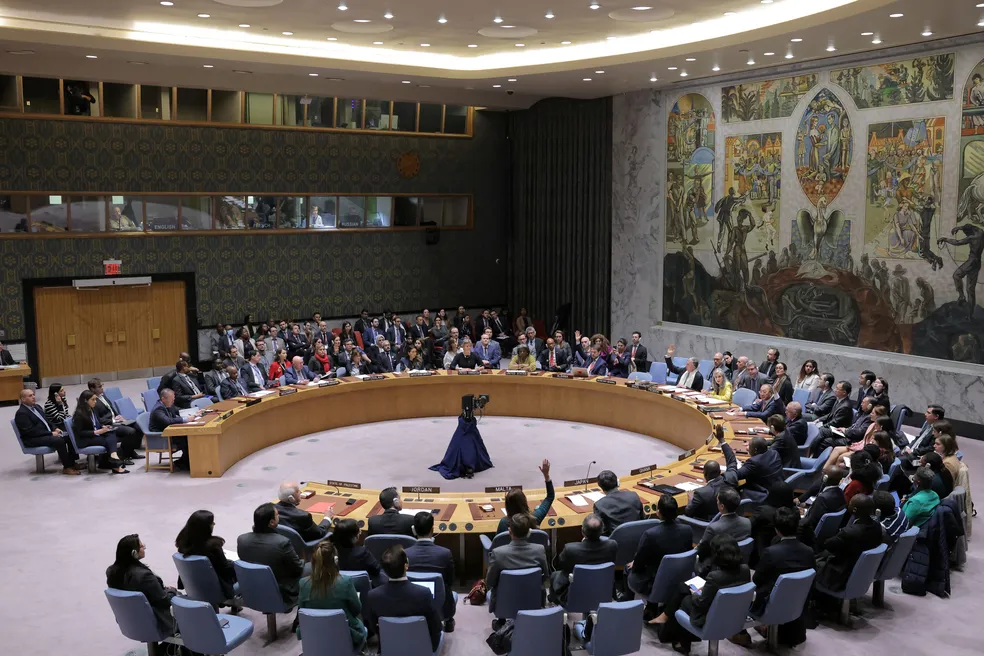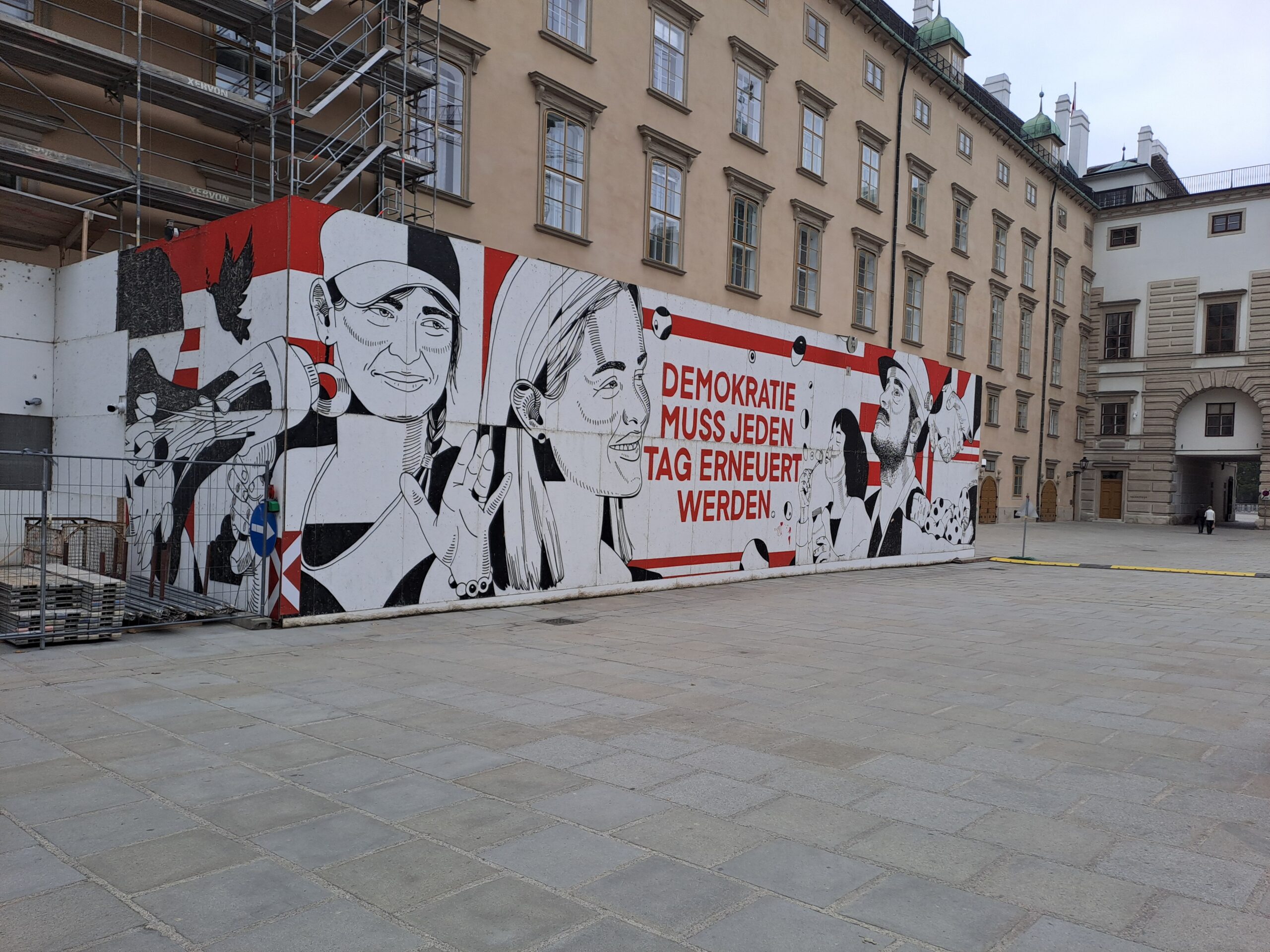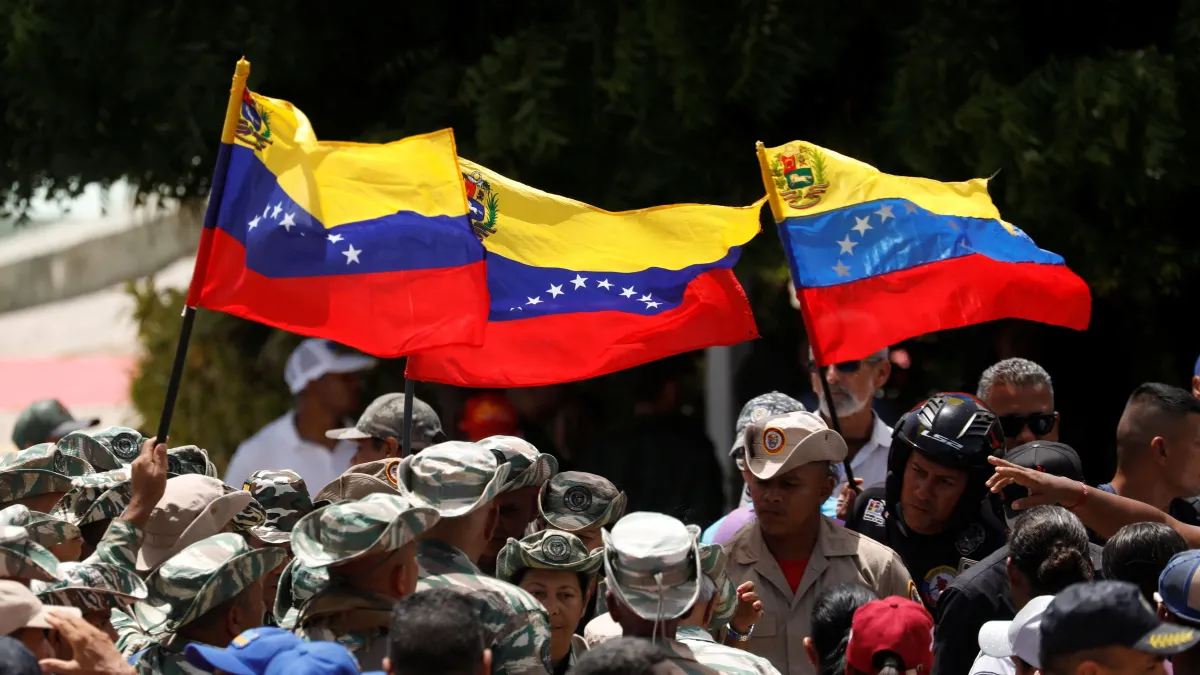On June 4, the United Nations Security Council (UNSC) voted on a draft resolution calling for an immediate, unconditional and permanent ceasefire in the Gaza Strip. The document received 14 votes in favor, but was not adopted due to one dissenting vote by the United States, which has veto power within the body. In 20 months into the conflict, the UNSC has only passed 4 resolutions, none of which have been implemented. Faced with the worsening humanitarian crisis in Gaza, the main international security institution within the UN continues to fail to act incisively, unable to combat the genocide of thousands of Palestinians.
Frozen power
The UNSC is one of the six original UN bodies, created in 1945 with the aim of maintaining international peace and security. It is therefore an institution that has the authority to create and regulate norms within this thematic axis, influencing the behavior of actors in the international system under various conditions.
Within the Council, there are 15 members, 5 of whom are permanent and 10 on a rotating basis. The permanent members, known as the P5, are China, the United States, France, the United Kingdom and Russia, who have special powers within the body, such as the power to veto any resolution. The composition of the group reflects the order that existed when the institution was founded after World War II, something that currently raises questions about the legitimacy of the positions.
The power of veto is exercised through a negative vote, which prevents any non-procedural resolution from being approved, even if the majority of members vote in favor. This authority is legitimized both by the UN Charter and by practice over the years, in a process that favours the interests of the P5, considering that its consent is required for decisions to be approved.
UNSC decisions are binding on UN members, who undertake to act in accordance with the resolutions passed. Thus, the Council is a body that concentrates power, having the ability to determine what is considered a threat to peace and security, and to establish actions with enforcement power, going beyond the recommendatory resolutions of other UN bodies.
According to Berdal (1996, apud Marques, 2022, p. 250), the attribution of veto power to five states in favorable positions within the international hierarchy is attributed to the idea of convergence of common interests, which would favor cooperation and legitimacy to guarantee international peace. However, with the Cold War, the UN’s role as a maintainer of international peace and security was frozen, making the UNSC a place of power struggle during the bipolar order. Over a period of 40 years, 162 proposals were vetoed, causing the body to come to a standstill.
With the end of the Cold War and the rise of the multilateral order, this freeze was not completely reversed, considering that to this day the power of veto continues to be exercised with a certain frequency in a scenario of strong integration between states. Thus, the UN still acts inefficiently in situations where the international order is disrupted.
The (non-)responses to genocide
The body’s responses and non-responses are political choices, which directly reflect on its credibility and legitimacy in fulfilling the purposes set out in the UN Charter. For example, in cases such as the genocide in Rwanda, the Council does not act in such a way as to intervene in crucial issues involving unjustified acts of aggression. Regarding these cases, Marques (2022, p. 252) states that “the institution has failed to fulfill its main objective: the defense of human rights and fundamental freedoms by guaranteeing collective security”.
With the escalation of the conflict in the Gaza Strip since October 7, 2023, discussions involving the creation of a Palestinian state, condemnation of terrorist groups and the possibilities of humanitarian aid have recurred in the UNSC. Since then, 13 resolutions have been voted on in the body, of which only 4 have been approved.
The resolutions adopted are: 1) S/RES/2712, of November 2023; 2) S/RES/2720, of December 2023; 3) S/RES/2728, of March 2024; and 4) S/RES/2735, of June 2024. The content of the files includes the obligation of the parties to comply with international law, especially with regard to the protection of civilians, the creation (and maintenance) of humanitarian corridors in the Gaza Strip, the release of hostages, and coordinated action between actors such as the UN and humanitarian organizations. It should be noted that only one resolution approved, S/RES/2720, mentions a commitment to the discussion on the creation of two states – and thus to putting respect for Palestinian sovereignty on the agenda.
The last resolution passed is more than a year old, and proposed an unconditional and immediate ceasefire with the support of all UN member states. However, the proposal explicitly rejected demographic and territorial changes in Gaza. It is also worth noting that the leader in the drafting of the resolution, or “penholder”, was the United States, which led the negotiations and was responsible for optimizing the decision-making process. To see more about the resolutions approved and rejected up to June 2024, visit: http://securitycouncilreport.org/atf/cf/%7B65BFCF9B-6D27-4E9C-8CD3-CF6E4FF96FF9%7D/unsc_gaza_extended.pdf
Since then, violence in the region has only increased. The daily murder of Palestinians continues unabated. In the name of fighting Hamas, the Israel Defense Forces (IDF) continue to bomb hospitals, schools and humanitarian aid sites. In addition to the attacks, hunger has also taken the lives of Palestinians, due to Israel’s blockade since March, which prevents the entry of food and medicine. As a result, Israel is actively blocking aid to the Gaza Strip, causing a deep humanitarian crisis.
In May, Israel announced that it would release access to a minimum amount of humanitarian aid through the Gaza Humanitarian Foundation (GHF), an institution developed through an Israeli and US partnership. A target of international criticism from UNSC members themselves, the GHF is accused of a lack of neutrality and little experience in humanitarian work. At the beginning of June, the organization halted operations in Gaza after Israeli fire on food distribution centers claimed the lives of dozens of Palestinians looking for food.
Faced with this catastrophic scenario, a new draft resolution was presented on June 4 to the UNSC by the body’s non-permanent members. The text demanded an immediate, unconditional and permanent ceasefire in the Gaza Strip, the dignified, immediate and unconditional release of hostages held by Hamas and other groups, and the immediate and unconditional lifting of all restrictions on the entry of humanitarian aid into the territory.
Although welcomed by the other members, the proposal was vetoed by the United States, the only one of the fifteen UNSC members to vote against it. According to the US representative, Dorothy Camille Shea, the proposal does not guarantee Israel’s security because it does not demand the surrender of Hamas and its withdrawal from the Gaza Strip.
A week after the veto in the Council, the UN General Assembly voted and approved a resolution demanding a ceasefire, condemning the use of hunger as a weapon of war, and calling for an end to the humanitarian blockade and the release of Israeli hostages. However, the resolutions approved by the UNGA do not have the same binding character as those of the UNSC. As such, they do not have the force of law and are considered to be recommendations to states.
According to Tom Fletcher, the UN Under-Secretary-General for Humanitarian Affairs, the situation is the result of a series of “deliberate choices that have systematically deprived 2 million people of the essentials they need to survive”.
While the largest institution responsible for ensuring peace and security in the international system chooses to remain inert, the genocide in Gaza continues to take place and gets worse every day. In the absence of a coercive international norm, the ceasefire becomes more and more distant, amid policies of domination that go unpunished even as they block any breathing space for the Palestinian people.
References
https://periodicos.ufpb.br/index.php/ricri/article/download/61983/35917/184501



